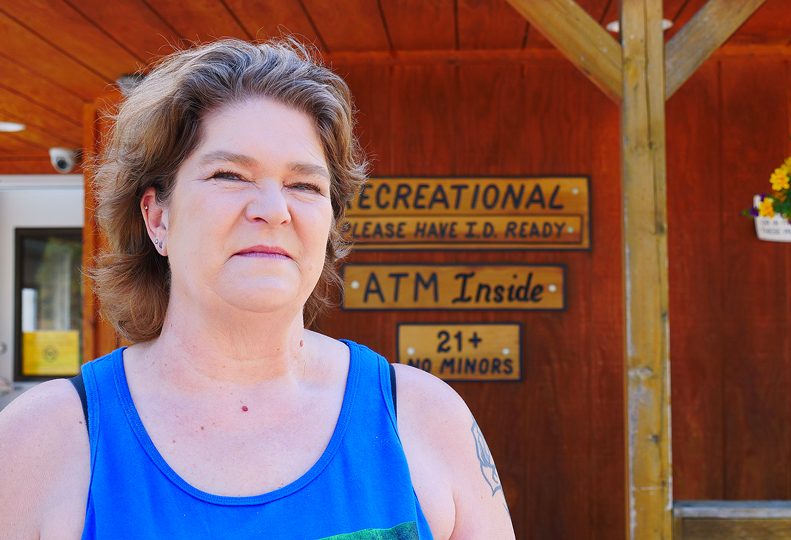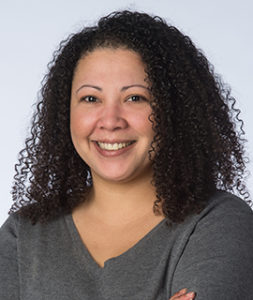
Home » Banking services for cannabis retailers remain limited
Banking services for cannabis retailers remain limited
Constraints are impacting retirement planning for one Spokane dispensary owner

Carol Ehrhart, co-owner of Spokane-based dispensary 4:20 Friendly, says saving for retirement is challenging due to limited investment options available to cannabis businesses.
| Erica BullockJune 20, 2024
It's been 12 years since Washington state voters legalized the recreational use of marijuana, and as of this year, nearly half of U.S. states and the District of Columbia have followed suit. Some cannabis retailers in the Spokane area, however, are still facing challenges accessing all of the banking products and services available to other types of businesses.
Investment products remain a challenge for some cannabis retailers to access, says Carol Ehrhart, co-owner of Spokane-based Four Twenty Friendly LLC, which does business as 4:20 Friendly.
Ehrhart says 4:20 Friendly now works with Numerica Credit Union for cannabis business banking, and the number of products and services she can access has increased significantly since the store first opened as a cash-only dispensary in December 2014, however a few financial products remain inaccessible.
"I can probably access (about) 90% of what they have to offer," Ehrhart says, referring to Numerica Credit Union's cannabis banking products and services. "I couldn't buy a mutual fund. I can't buy stock on the stock market. There's certain things that federally would be considered money laundering that we still can't do. We can't accept credit cards."
Ehrhart, 53, says she's frustrated about the limited savings options available to fund her future retirement plans.
To open the dispensary, Ehrhart says she cashed out a 401(k) account to finance the construction of the store. She wasn't allowed to replace the funds in the account with a different local bank due to her association with the marijuana industry.
"For the first time in my life, I actually have a little bit of a savings account, and I can't do anything with it," she says. "You can't do things that anybody else would be able to. In fact, from an accounting perspective, I'm losing money because I can't do those things because the amount of interest on a basic savings account is lower than if I could buy stock or put money in a mutual fund."
Ehrhart also works as an independent accountant and owns 4:20 Friendly with her wife, Alissa Taylor. The 500-square-foot cannabis dispensary is located at 1515 S. Lewis, in west Spokane.
Numerica has been providing financial services to cannabis businesses in Washington state since 2014, says Megan Denny, assistant vice president of commercial account operations.
Not all banking products are available to cannabis business account holders, such as foreign wire transfers, she concedes, however marijuana-based companies can access checking and savings accounts, digital banking, automated clearing house origination, remote deposit capture, and online domestic wires.
The credit union also now offers loans for cannabis clients.
Lakyn Machuga, vice president of cash management at Numerica, says the credit union started offering loans to cannabis clients in October in an effort to live up to its goal as a full-service financial institution for cannabis retailers, producers, and processors.
Machuga says cannabis accounts comprise less than 1% of Numerica's membership, and while there has been some interest in the lending program, she doesn't expect that loans for these companies will "be a high-demand, high-volume stream of revenue."
Ehrhart notes that financial institutions have additional compliance requirements in order to serve the cannabis industry, which increase the costs of some products compared to other business accounts.
"If you go make a deposit with $10,000 in cash, they have to do additional paperwork to tell the federal government," Ehrhart says. "Some places will give you a loan knowing that we're cannabis, but they'll charge us 30% interest because we're high risk. It doesn't matter how good my credit is."
At Numerica, Machuga says the organization charges higher fees, but they are in line with the additional due diligence required to service cannabis banking accounts.
There's still room to expand banking products and services for cannabis companies, although Ehrhart says that financial access has significantly improved in the last decade, when holding and transferring large sums of cash created safety concerns for the dispensary.
"It was frustrating at first because not only were we forced to be a cash-only business because no bank would deal with us, we would leave in the middle of the night and drive $60,000 to $80,000 in cash across the state," she says. "We'd have to take our sales tax down to the local office here, and we'd have to take excise tax to Olympia, and we had to do it twice a month for about a 1 1/2 years."
After obtaining a bank account, 4:20 Friendly now pays excise tax by check or electronic funds transfer and sales taxes are paid by electronic funds transfer, Ehrhart says.
Machuga says Numerica has addressed the banking options under its control and is shifting to focus on normalizing cannabis-related businesses.
"When we say we're full service, we mean that, and that includes lending and deposit products," Machuga contends. "We're really trying to help serve your business in as much of its entirety as we can."
Going forward, both Numerica and 4:20 Friendly will continue following the progress of federal legislation that may one day expand access to financial services for the marijuana industry. Additionally, both companies also are watching the progress of a new federal rule that's been introduced to move marijuana from a Schedule 1 to a Schedule 3 drug under the Controlled Substances Act.
Drugs and other substances are placed in five schedules based on the currently accepted medical use, abuse potential, and likelihood of causing dependence when abused, according to the Drug Enforcement Administration's website.
Schedule 1 controlled substances lack acceptable medicinal use and include heroin, LSD, cannabis, peyote, and ecstasy. Examples of Schedule 3 controlled substances include Tylenol with up to 90 milligrams of codeine, testosterone, ketamine, and anabolic steroids.
The Senate Committee on Banking, Housing, and Urban Affairs has introduced the Secure and Fair Enforcement Regulation Banking Act, also known as the SAFER Banking Act, that will provide general federal protections for state-sanctioned marijuana businesses and financial service providers, federal reserve banks and federal home loan banks, and insurers, according to a congressional summary of the bill.
Brian Smith, communications director and spokesman for the Washington State Liquor & Cannabis Board, says that under current state laws, cannabis-related businesses can only use state-chartered financial institutions for banking services.
There are 38 state-chartered financial institutions in Washington state and 75 that are federally chartered, according to data from the Washington state Department of Financial Institutions and the Federal Deposit Insurance Corp.
Banks and credit unions, lenders, insurers, and others serving the cannabis industry won't be penalized for serving cannabis businesses if the bill passes, likely increasing the accessibility of financial services for the industry, according to a summary of the SAFER Banking Act by the American Bar Association.
"The (SAFER Banking Act) will allow a form other than cash to be used in the store," Smith explains. "Federal credit card and banking restrictions prevent cannabis sales being done in a form of anything other than cash. The Safe Banking Act would clear the way for these banks to allow credit cards to be used for these transactions."
Machuga says the organization is prepared to partner with credit card companies and members of the credit union if Senate Bill 2860 becomes law.
Ehrhart, however, says, "I'm not holding my breath for anything to get passed. I really think the only way anything is going to get passed is to move to a Schedule 3."
Marijuana's classification as a Schedule 1 drug has been in place since the Controlled Substances Act was enacted in 1970, according to the U.S. Department of Justice.
Smith says, "We're hopeful that (rescheduling) is going to open up some banking services for the cannabis space down the road. The main thing is that it would be treated like any other product. ... There's bipartisan support out there for safe banking services for those states that have it. It's getting closer."
Latest News Special Report Banking & Finance
Related Articles
Related Products


![Brad head shot[1] web](https://www.spokanejournal.com/ext/resources/2025/03/10/thumb/Brad-Head-Shot[1]_web.jpg?1741642753)

